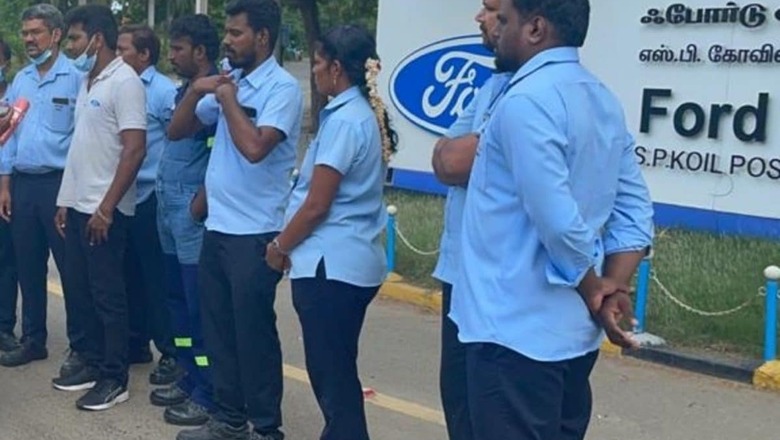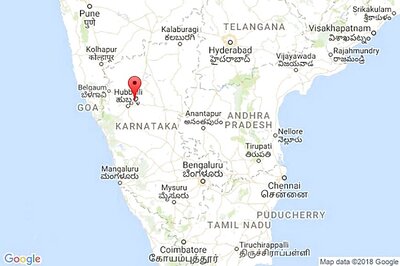
views
The pandemic-stricken sales numbers, the weak consumer sentiment and the resultant pricing pressure, and an industry in the throes of costly fuel and a staggered transition to electric vehicles—the ingredients for a bleak year were all too clear for the workers of the Ford factory in Chennai. But the exit was a bolt from the blue.
“That was unexpected. We were expecting some of ‘restructuring’, as they call it. But what happened was something we did not foresee…” says a factory union member who wishes to remain unidentified.
Factory workers talk about cancelled weddings, home loans hanging in the balance, and fears of ancestral homes spiralling into the hands of creditors; even though the factory is currently functioning and Ford is keen on compensating workers generously, the chilling effect of such a closure is only acute. “The problem is that we’ve all started making long-term plans now. Most of us are on some home loan or the other; half the salary goes towards EMIs. This could not have come at a more problematic time…” said the factory union member.
The sad denouement to Ford’s manufacturing journey contrasts spectacularly with its effervescent entry into the southern state. It was at the fag end of J Jayalalithaa’s tempestuous government beginning 1991. Amid a time marked by corruption scandals, allegations of nepotism and over-the-top birthday celebrations of those enjoying the political glow of Jayalalithaa, the Ford deal was sealed.
The factory, located over 40 kilometres off Chennai, was the result of diligent wooing by a crack team of bureaucrats—Jayalalithaa wanted the factory at any cost; the American multinational was scouting for space in western India. Arriving as a partner to Mahindra & Mahindra, Ford was testing the waters of an emergent economy looking to go beyond the Maruti, backed by the wave of economic liberalisation through the early 1990s.
Hyundai followed Ford, and it led a wave of foreign-domiciled global automakers from Renault-Nissan to Daimler to the PSA Group now. Ringing this galaxy of global automakers is a collection of auto component makers who’ve added to the brand of Tamil Nadu as an automotive manufacturing hub. Some call it the Detroit of South Asia, although that claim is contested by observers who’ve pointed to emerging hubs in Thailand and elsewhere. Still, the entry of Ford marked a key inflection point in India’s journey as a manufacturing hub. Sanand in Gujarat was the chosen destination for Ford’s second plant. But, the joyride didn’t last.
“Ford India will cease manufacturing vehicles for sale in India immediately…[the company] will wind down vehicle assembly in Sanand by the fourth quarter of 2021 and vehicle and engine manufacturing in Chennai by the second quarter of 2022,” the company said in a statement this month. Ford said it will continue to work closely with employees, unions, dealers and suppliers to care for those directly impacted.
Ford’s exit leaves behind over 3,000 factory workers whose careers, livelihoods for many, have taken a setback. A large factory closure also brings out the siloed nature of manufacturing jobs. With volume and quality being the important parameters of excellence, labour quality in terms of breadth of experience is limited, unlike in technology or software jobs where employees pick up a range of computer languages within a short period of time. “The mid-career professionals are the worst hit. They’re not employable elsewhere nor have they saved enough to just retire and ride out of the market. They’re badly stuck,” says Arumugham M, a 36-year-old worker at the Ford factory. He has a boy in the fourth grade, and he’s already rustling up old resumes to set out for what looks like a punishing search for a job.
Tamil Nadu and factory closures have a history. In October 2014, Finnish phonemaker Nokia left out its Chennai factory in a multi-million dollar sale to Microsoft. The plant itself was attached by the I-T department over withholding tax dues. Jobs were lost in thousands over a matter of weeks; Nokia paid compensation generously but the exit led to a domino effect that impacted a clutch of suppliers who also shut down. The chilling effect of successive closures doused the economic activity around Sriperumbudur off Chennai.
The Ford factory closure is expected to impact suppliers and hundreds of car dealers who’re lobbying through industry associations for better terms of exit. Tamil Nadu headed by the new government under MK Stalin is trying to salvage the situation by selling off the factory to a buyer. The workers at the Ford factory harbour the hope that the prospective buyer would continue employing them.
Read all the Latest News , Breaking News and Ukraine-Russia War Live Updates here.




















Comments
0 comment